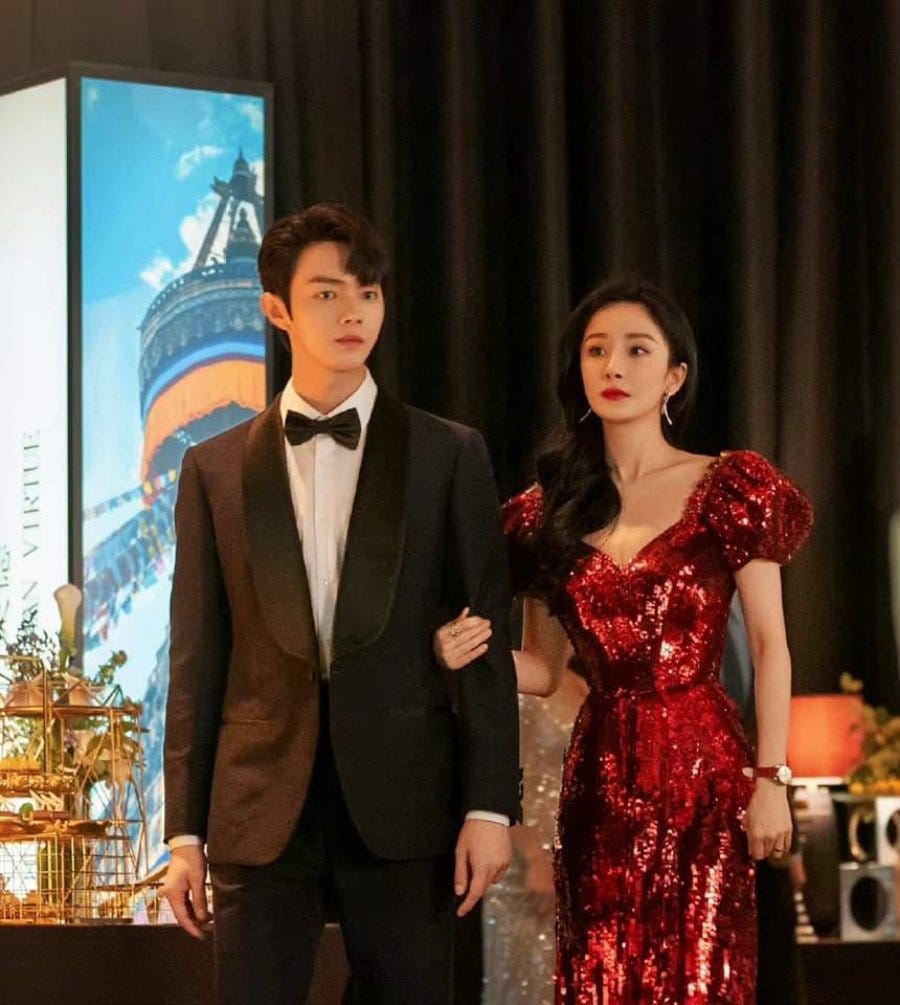If there’s a constant in the Asian drama landscape, it is this: C dramaland can always be relied upon to churn out their fair share of contract marriage dramas every year. What’s even better is that even when they’re on the trashy side, they’re still watchable if one has a FF tool at one’s disposal. She and Her Perfect Husband isn’t quite that bad. But it does come fully stocked with a whole host of rather loathsome creatures that have to be endured in order to get “to the good stuff”. No doubt the unlikeable characters are present due to the pressing need to hit the magic 40 episode target. Otherwise there’s really no justification for a rom com about two people who fall in love after faking their marital status to be more than 20 episodes. Consequently, the contract relationship side of things becomes more of a MacGuffin to moralize about the current state of male-female dynamics that’s leading to large scale social dysfunction. This observation is much more reflected in the Chinese title The 80/20 Rule of Love.
She and Her Perfect Husband is a legal drama that stars notables like Yang Mi and Xu Kai as the titular characters. They are both decent in their respective roles and their chemistry is surprisingly effective. And considering the age gap — quite convincing. I’m not usually a partaker of “noona romances” — an older woman paired up with a younger man — but this one has a quirky charm to it that has no pretensions about taking itself too seriously. The key to this I attribute to the scripting of the leads and their dynamic. Yang Mi is Qin Shi, a legal eagle on the promotion track for partner at her firm. Xu Kai plays Yang Hua, an unambitious WFH stock trader who seems to have given up on the rat race almost entirely. His reasons for doing so are unclear at this point but there’s very little doubt in my mind that he was very good at what he did before retreating into semi-seclusion with his pet turtle.
The trouble starts in part when Yang Hua’s domineering mother is determined to have him return to the land of the living. She throws herself into organizing blind dates on his behalf but he will have none of it. One day in an effort to put a stop to one of Mother’s set-ups, he runs into Qin Shi’s boss and she mistakes him as Qin Shi’s non-existent husband. He discovers soon after that Qin Shi found him on social media and used his photo to convince her boss Tang Yi-hui that she’s tied the knot. It’s an unspoken stipulation of many law firms who apparently don’t want the hassle of nurturing employees who have no intention of committing themselves long term to one place. I guess the logic here is that a married woman who has the burden of a mortgage and other bills to pay is more likely to want job security and hang around longer than a footloose and fancy free single female.
Not too surprising Yang Hua is nonplussed and unimpressed about suddenly being someone’s fictional husband so the fun and games begin. Because he’s not a bad lad, he gives her 3 days to announce their fictional divorce. From this point onwards their contract relationship more or less begins as they navigate the rough seas of demanding employers, troublesome relatives and unwanted rivals. It’s a process of accommodation, negotiation and renegotiation that keeps them both on their toes.
Unfortunately to get to the heart of the contract marriage story, one has to climb over or push through an obligatory romantic comedy rogue’s gallery as it were. While it is understandable that Yang Hua’s Tiger Mother wants him to be a responsible adult holding down a job and meeting women with a view to marriage, somewhere along the way she crosses an invisible line and her hen-pecked husband seems happy to let her. This escalates to the point where Yang Hua feels compelled to move in with Qin Shi and construct a fictional story about the nature of their relationship. As if Qin Shi doesn’t have enough problems of her own, she is constantly called in to clean up after her brother and bestie sister-in-law’s neverending pile up of domestic upheavals. His infidelity upsets her. She throws tantrums in feeble protest but neither of them will budge whenever the subject of divorce is tabled. Then there’s Qin Shi’s ex-fiance, Tao Jun-hui, who is now supposedly dating a younger woman from Qin Shi’s office but in front of Yang Hua and Qin Shi, he likes to pretend that he still has a claim on her affections. Most of the hijinks seems to come from Other People with their own hang ups which they inevitably impose on the leads. Even though Yang Hua seems to present himself as a case of late onset teenage rebellion, his mother who should know better is too confrontational (too much of a stereotype) to be sympathetic. It’s literally her way or the highway.
However, what’s far more interesting about this show is the perspective that Yang Hua represents in this narrative. His lack of ambition is humorous to watch as he lays down, in no uncertain terms, his philosophy of taking things easy. Thus making him the ultimate outlier in a society that is entirely geared towards maintaining the nation’s economic engine. He is a non-conformist in the broader sense. For that reason alone he is a far more fascinating (if underdeveloped) character than Qin Shi who despite her ability and career achievements is really a cog in the machinery and an indentured labourer to the system. She has capitulated to it like the vast majority of the population because there is apparently only one game in town. The drama isn’t unsympathetic to her dilemma but she becomes a part of the problem as much as she is a “victim” of it. She’s given tacit approval to it. She’s had to give up one of her core principles to get ahead in her field. So in effect everything comes with a price tag. Capitulating once means the possibility of repeated instances of capitulation. Lying to her employers means she’s had to build an entire narrative around herself based on layers of deceit. It may seem harmless at first but as Yang Hua points out he was an innocent bystander that was inadvertently dragged into her world. Regardless of what she thinks, Qin Shi isn’t the captain of her ship especially now that Yang Hua is in the picture. Cooperating with him has advantages but the applecart has been upset. Furthermore even before he arrives on the scene in full technicolour, her paymasters are calling the shots and she’s their willing servant so that she can jump over hoops to get to that promotion which she can’t even be certain that she’ll ever get. She might be a highflying lawyer but she’s still subject to the whims of her powerful female director (co-owner of the firm) who constantly dangles a carrot under her nose and has her tap dancing to her tune. Corporations by virtue of their size and their modus operandi are large sociopathic beasts driven by profit. Therefore the so-called gender inequities are far more complex than first meets the eye. What’s even more telling is that the biggest “villain” so far that I can see is a supposedly highly successful businesswoman who is conducting dubious business transactions using shell companies.
The complexity of this world is quite provocative. There’s definitely much more going on than meets the eye. Whether it’s deliberate that remains to be seen. Moreover I’m assuming too that the sensitive Yang Hua experienced something quite traumatic in his past to have removed himself from the labour market entirely. He seems determined to eschew the dog eat dog mentality to the point of defying his mother. It does beg the question: What happened to him? Dig deep and this doesn’t seem to be about men vs women at all. For instance, Tang Yi-hui (Qin Shi’s boss) who on her watch has the chance of making a difference in the workplace for the sisterhood continues to perpetuate the narrative. It’s obvious that when people gain the power they have craved, they become their own gatekeepers regardless of their sex.




This drama is pretty, but I was expecting something funnier. And the second couple plus the ex are drags. I wish for more cohabitation cuteness and less office scheming.